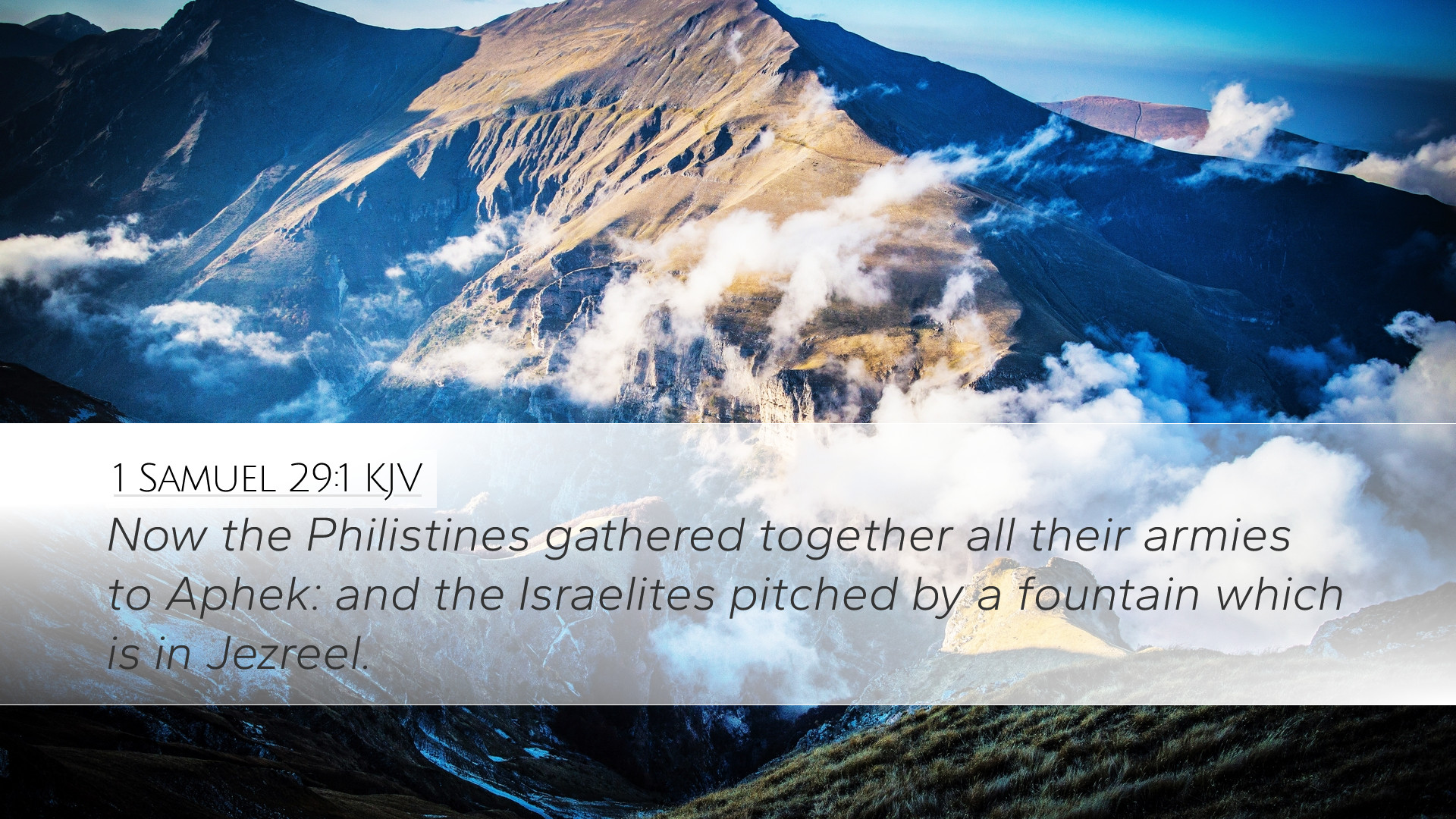Commentary on 1 Samuel 29:1
Verse: "Now the Philistines gathered together all their armies at Aphek: and the Israelites pitched by a fountain which is in Jezreel." (1 Samuel 29:1)
Contextual Background
The context of 1 Samuel 29 is critical for understanding the unfolding drama between the Israelites and the Philistines. This chapter occurs during a tumultuous period in Israel's history, characterized by ongoing warfare and opposition from the neighboring Philistine nation. At this time, King Saul was still reigning over Israel, but his leadership was marked by instability and fear, particularly in the face of rising Philistine power.
The Gathering at Aphek
According to Matthew Henry, the reference to Aphek as the gathering place for the Philistine armies indicates not only a geographical location but also a strategic one. Aphek has been recognized historically as a significant site for military confrontations, thus symbolizing the Philistines' intent to establish a formidable front against Israel.
Albert Barnes adds that the assembly of all Philistine armies represents a united front, suggesting that the Philistines were gearing up for a major campaign against Saul and the Israelites. The gathering displays the confidence of the Philistines, who believed they could decisively crush Israel's military hopes.
The Position of Israel
In juxtaposition, the Israelites are described to be encamped by a fountain near Jezreel. Here, Adam Clarke notes that the fountain symbolizes a source of life and sustenance for the Israelites as they prepare for battle. This reflects God’s providential care even in the seemingly dire circumstances, allowing them access to water—a critical resource in warfare.
The location at Jezreel, a fertile plain, underscores the significance of this impending confrontation. Matthew Henry asserts that the setting should elicit thoughts of hope, yet it is tinged with anxiety given the looming conflict. The Israelites had not only to fortify their physical defenses but also to seek God's counsel and strength amid the hostile encroachment.
Theological Reflections
This verse ultimately invites contemplation on themes of divine sovereignty and human agency. The allied forces of the Philistines represent the nations opposing God’s chosen people, yet it also raises the question of Israel's fidelity to God amidst such challenges. Albert Barnes remarks on the moral implications of the Israelites’ previous alliances, especially with David, who was in service to the Philistine king, Achish. This connection complicates the narrative by highlighting the intertwining of loyalty and survival.
Lessons for Believers
1 Samuel 29:1 serves as a reflective prompt for pastors, students, and scholars. The following insights are vital lessons derived from this verse:
- Unity in Adversity: Just as the Philistines gathered all their strength, the church must also unite in the face of adversity, relying on collective prayer and support.
- Divine Provision: The presence of the fountain symbolizes God’s provision; believers should seek God amid challenges, recognizing His ability to sustain us.
- Critical Choices: The Israelites’ precarious situation reminds us of the importance of making wise choices that align with God’s will, particularly when facing ethical dilemmas.
- God’s Sovereignty: Even in overwhelming circumstances, God remains sovereign. Understanding His control can bolster faith and provide peace amidst turmoil.
Conclusion
In summary, 1 Samuel 29:1 encapsulates a moment of tension just before a significant military encounter. It puts into perspective the dynamics of power, human alliances, and the overarching sovereignty of God. For pastors, students, theologians, and Bible scholars, this verse serves as a crucial reminder of the necessity of faithfulness to God, even when the odds seem insurmountable.


